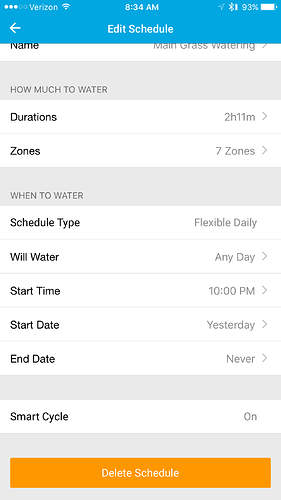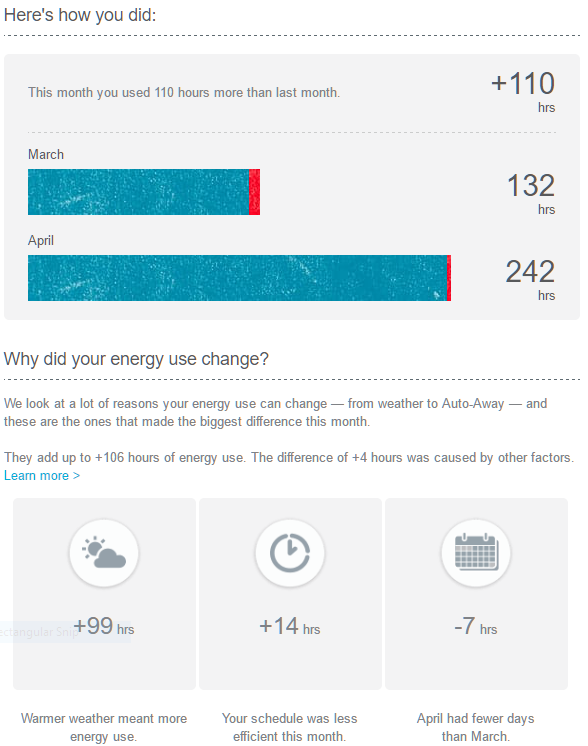So I have used the system for about month and I can see gallon used but why don’t it show that I have saved any?Uploading…
We currently don’t reflect water savings in flex scheduling.
Here is some more information on the topic.
We hope to have a mechanism in place in the future to display savings.
Can you do one with generation 1
It seems like Rachio should delete water savings altogether. The only real baseline is a customer’s water bill before and after Rachio. Isn’t that correct?
agree 100% with @robertokc. For most of us using flex, these lines about savings and pool sizes are wasted space, and worse, a source of annoyance that we can’t calculate them for our little backyard. In addition, my utility does not bill by calendar month…So I did exactly what you suggested @robertokc, using the previous year bills. I quickly realized that even with the dumb schedule I had quite massive variations due to climate variation (very wet in 2013/14), while 2015/16 got my attention.
Attached is an illustration of how I create happiness for my little world.after only two bills covering rachio, and I LOVE IT! For fun I now also track the current month (adjusted gallons used in billing cycle less household base load):
Wow! Can’t see this too well on my phone. But it looks like you took water billing and merged data from Rachio. Maybe you can explain how you created this bar graph. Now you are on to something. Perhaps use the winter average as your indoor average usage. Exciting stuff. I like it.
I too agree 100% with @robertokc and @hgugger!!! There is no reasonable way for Rachio to calculate my water savings, seeing as they can’t know what I did/used before. And I ignore the gallons used as it’s depends on the accuracy of my nozzle settings AND the square feet of the area that I’m watering, which is dependent on me going out and calculating that area. And my utility also does not bill on calendar month.
But my before and after bills I can see and that IS what counts when it comes down to savings. (My biggest savings is that because I’m in the Smart Water Program, I don’t get my usage moved into the highest, most expensive, tier. In two months alone this summer that more than paid for the cost of my Rachio unit!)
I’m not as fancy as doing the charts that you’ve done @hgugger. I love them!! But I’ve just been tracking my CCF usage in a simple spreadsheet. (My sprinkler system is on a separate meter.) Still love seeing those $$$ savings, while my yard keeps looking good!!
@Linn, @robertokc, @franz
I have cleaned up my excel workbook with automated graphs.
There is one tab to set up some initial calculations to
- convert rachio gallons used into your “true” gallons used
- based on your water bill (CCFs used and water related charges) calculate $/CCF
- determine household base load (if on one meter only), and factor it in where necessary
there is a Log tab to input what you pull from WU in terms of rainfall in your neighborhood (I use 3 stations for comparison of local rain events).
Every tab has a commentary to make input easy.
Once set up with your own data, the only thing to do is to input daily precipitation and irrigation. Rest is automated. Nothing is protected, so you could play with it and modify as you like.
I am more than happy to make this available as is, if desired, but I don’t know if there is a corner to upload user content other than jpg files? Franz, could you please advise?
Cheers
Heiri
Sure, but with a huge variable (weather), how do you determine what was the benefit a smart controller on your water bill? You really can’t, unless you average out over multiple years before and after installing the controller.
The controller can do this very easily, really. It’s only a matter of diff’ing the smart vs dumb schedules. You wouldn’t even have to create a “base line” either. What if that base line changes? It will… I have 3 small girls, and right now, I deal with their bath time. I guarantee you my “base line” will change when they get into their teens, both with regards to showers, and clothes washing. If the controller just does schedule diff’ing, I never have to worry about that.
My 2 Nest controllers shows me what I’ve saved from month to month. Might not be 100% accurate from my old controller, but it does a fair job, also showing my why there was a difference from the month before. (warmer weather, manual overrides in temperature, schedule changes, being away, etc) No reason Rachio couldn’t do the same.
Come on guys, it doesn’t have to be accurate to the gallon, it’s just an indicator on how well the system is working.
My water bill is the determination on well I’m doing. I’ve been involved with smart controllers for about 16 years. It would be meaningless to me to see water savings from Rachio. I would be suspicious of their numbers. I played around with the Hunter Hydrawise app and started getting sensational emails that I had saved 60 percent when I did not even own their product.
I don’t think anyone was questioning your experience with smart controllers, so I’m not sure why you bring that up at all. But, congratulations with 16 years in the smart controller business…
Anyways, YOUR previous bad experience shouldn’t dissuade the rest of the community from trying to find something that works for them. Simply because you don’t like a given measurement doesn’t really qualify it being removed from the product. Just ignore it if you don’t like it; like TV commercials, political pieces in a tabloid, or annoying internet ads. Well, it all boils down to politics in the end, I guess.
For you, your end water bill is the most important. For me, the healthiness of my yard is the most important, even if water consumption goes up.
I’d like to follow the progress based on some number, and a Smart vs Dumb schedule would (IMO) be a good number to see, and easy to calculate.
Gallons per month is also a nice-to-have number, but again, the change in weather makes it hard to make any sense out of it. It’s a bit like watching the sum of your portfolio, without knowing how the stock market performed.
Historical Precipitation Data, Sugar Land, TX:
July 2009: 0.96" of rain
July 2010: 15.90" of rain
July 2011: 0.06" of rain
How do you even gauge you sprinkler performance, just by looking at your water bill, if you don’t compare it to the actual precipitation?
Again, I’ll bring up my Nest controllers, which, just like Rachio, is affected by the weather and other factors:
Neat, right?
100% accurate; probably not. Better than not having any performance indicator; surely!


What I do to measure my overall success using the Rachio is track the accumulated amount of time any zone is ‘on.’ And then make judgment on how I’m doing relative to 13 months of historical data. I collect the data real time, put it up to the cloud, and then make it available to be viewed with an Internet browser by anyone. See http://www.welserver.com/perl/plot/WEL0343/Sprinkler1.png for a 13 month chart of daily sprinkler usage, and see http://www.welserver.com/perl/plot/WEL0343/Sprinkler2.png for another 13 month chart of monthly sprinkler usage.
Obviously this is only a good start at measuring the performance of a sprinkler system. Right now I’m not measuring water flow volume to reflect the differences in water usage from zone to zone, not integrating degree days (I am measuring it though), and not measuring rainfall (not sure how to get this into my system without going to the expense of purchasing my own rainfall sensor).
And I haven’t figured out the appropriate Figure Of Merit. What is the theoretical perfect amount of water minimally needed for each zone for good grass/plant/tree life, versus what I’m putting down. I’m sure I’m still putting down too much, but, for now my only benchmark is to put down less than historically.
Maybe volume of water converted to inches of rain, minus actual inches of rain, rationalized for average outside temperature, is the algorithm, in general.
I’m thinking about it.
Best regards,
Bill



